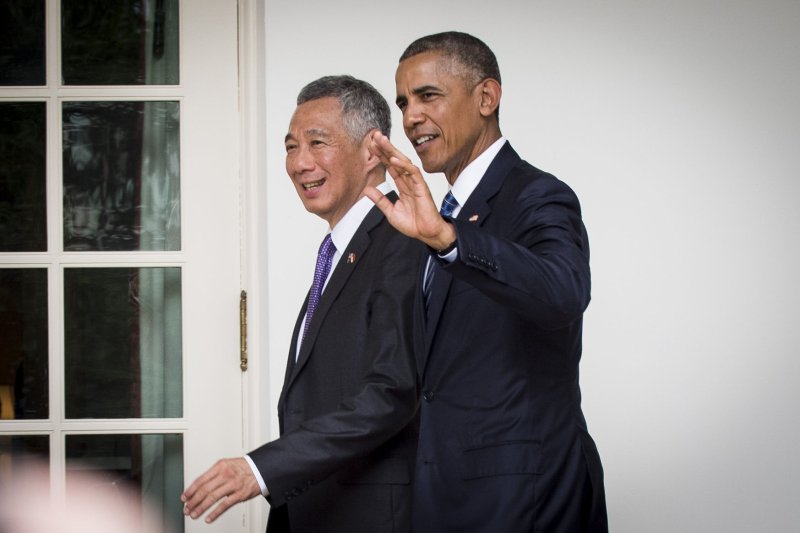1 of 4 | President Barack Obama and Prime Minister Lee Hsien Loong of Singapore make their way to the Oval Office on Tuesday for a meeting following a State Welcome Ceremony on the South Lawn of the White House. Lee is in the United States to discuss counter-terrorism measures and the Trans-Pacific Partnership with Obama. Photo by Pete Marovich/UPI
|
License Photo
WASHINGTON, Aug. 2 (UPI) -- The prime minister of Singapore, Lee Hsien Loong, met with U.S. President Barack Obama at the White House on Tuesday, where the two leaders agreed to strengthen ties while pushing for the Trans-Pacific Partnership trade deal.
The heads of state agreed on the need for open markets and free trade, and urged countries to ratify the TPP to support innovation and "commercial connectivity," according to a White House press statement.
"Through a half-century of diplomatic relations, the United States and Singapore have forged an expansive and enduring relationship by cooperating on issues of mutual interest and shared principles," the White House said Tuesday. "Both leaders committed to further enhance the U.S.-Singapore strategic partnership, making it deeper, more substantive, and more effective to better support peace, stability, and cooperation across the region and around the world."
Kicking off his visit to Washington, D.C., the Singaporean prime minister warned the United States' credibility is at risk if the Trans-Pacific Partnership trade deal is not enacted.
Lee on Monday called the trade pact an "economic game changer" that adds "substance to America's engagement in the Asia Pacific" region.
The TPP has been signed by 12 Pacific Rim nations, notably excluding China, but has not been ratified by all signatories.
In the United States it faces a tough ratification process. While Obama endorses the TPP, neither Hillary Clinton nor Donald Trump supports it, and the Republican-led Congress has no plans to introduce the TPP for consideration until after the November election, if at all. Delegates at last week's Democratic National Convention were loudly opposed to the deal, believing it would hurt U.S. workers.
"For America's friends and partners, ratifying the TPP is a litmus test of your credibility and seriousness of purpose," Lee said in his speech at a reception organized by the U.S. Chamber of Commerce and the U.S.-ASEAN Business Council. "Every one of the TPP signatories has had to make sacrifices in order to accept the TPP agreement, and jointly bring about this win-win outcome."
The pact is designed to counter growing Chinese economic power, and the 12 countries involved, including Singapore, account for 40 percent of the world's gross domestic product and a market of 800 million people.
Obama told the Singapore Straits Times in an interview Monday: "I know that the politics around trade can be very difficult, especially in an election year."
"There are legitimate concerns and anxieties that the forces of globalization are leaving too many people behind, and we have to take those concerns seriously and address them. The answer isn't to turn inward and embrace protectionism. We can't just walk away from trade. In a global economy where our economies and supply chains are deeply integrated, it's not even possible."
Although Obama may be able to offer few assurances to Lee regarding the TPP, other issues, the two leaders reinforced their commitment to the 2015 Enhanced Defense Cooperation Agreement, under which 1,000 Singaporean security personnel are trained or stationed in the United States each year. The United States rotates aircraft and ships to Singapore to carry out counter-piracy and counter-terrorism operations, as well as humanitarian and disaster relief missions.
The White House will also present a black-tie state dinner Tuesday in Lee's honor.















